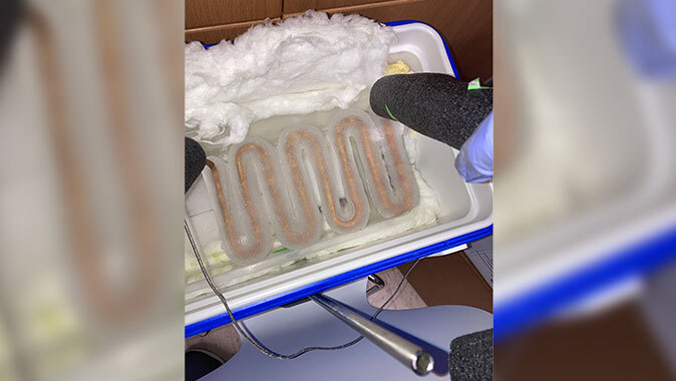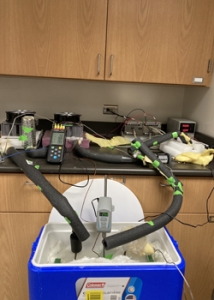
An emerging method of freezing seawater to produce freshwater was one of the featured projects at the 2021 Fall Undergraduate Showcase on December 10, hosted by University of Hawaiʻi at Mānoa’s Honors Program and Undergraduate Research Opportunities Program (UROP).

Senior mechanical engineering majors Justin Yip and Deylen Nekoba began the project in fall 2020, after the idea was proposed by Assistant Professor Woochul Lee. This public impact research may have worldwide implications because less than 1% of freshwater resources around the globe are accessible by society. Remaining freshwater is mixed in with saltwater or contained in glaciers, according to the research team.
Desalination is a common practice to remove salts and minerals from seawater. However, conventional methods, such as boiling the water, require large amounts of energy to turn the water into steam. Freeze desalination is an emerging field of research studied in academia.
“Changing water to an ice phase requires one-seventh the energy than boiling it all to steam,” Yip said. “The supply of clean freshwater is also a very necessary resource in Hawaiʻi, so having access to a resilient source of potable water is important, especially in times of drought or other disasters affecting freshwater availability through Hawaiʻi’s aquifers.”
Eliminating salts through freezing
The students created the innovative tool, which freezes the water and eliminates the salt as the icy layer grows. The ice is then transferred to a washing system, which removes remaining salt from the surface of the ice. Results from the project showed that while salinity was still too high for drinking water standards, they were still able to eliminate a large amount of salts and minerals from the seawater.
“We hope our project inspires others to consider the importance of water conservation and the constant need for fresh drinking water,” Nekoba said. “In our presentation, we mentioned condensing the setup in future work; this will allow the setup to be transported and tested in different locations and conditions.”
Yip added, “Our freeze desalination setup also runs off electricity, meaning it could be possible to run this with renewable energy. Hawaiʻi also has a renewable portfolio standard of 2045 of zero-emission electricity sales, so a desalination setup like this can potentially use the excess renewable energy generation that would otherwise be curtailed (in the future) to generate drinkable water.”
Yip and Nekoba received a total of $15,861 over the past two semesters from UROP to assist with material costs and stipends.
“UROP has been integral for our project and we would not have been able to accomplish nearly as much without their help. Our mentor Dr. Lee also deserves much credit for challenging us to consider different methods of approach to reach a solution as well as emphasizing to us the importance of documentation and changing only one variable at a time when implementing changes to the system,” Nekoba said. “I now feel much more confident in my ability to perform any research experiment in the future, and I have also gotten better at my ability to communicate any findings with my peers.”
Undergraduate student showcases
Yip and Nekoba were among 27 students presenting 22 projects at the virtual 2021 Fall Undergraduate Showcase event. Other topics included parent and child anxiety during the COVID-19 pandemic, farming in space and civic engagement of Oʻahu young adults. Undergraduate Showcase events are held every semester and are open to all UH Mānoa undergraduate students in all fields of study conducting a research project or creative work. For more information, visit the Undergraduate Showcase website.
These events are examples of UH Mānoa’s goals of Enhancing Student Success (PDF) and Excellence in Research: Advancing the Research and Creative Work Enterprise (PDF), two of four goals identified in the 2015–25 Strategic Plan (PDF), updated in December 2020.
—By Marc Arakaki

